Russia Crypto Mining Compliance Checker
Check Your Compliance
Enter your mining details to see if you comply with Russian regulations.
Compliance Guide
Registration Required: If you use more than 6,000 kWh per month.
Full Bans: 10 regions have complete bans until March 15, 2031.
Seasonal Bans: Siberian regions have bans from November 15 to March 15.
Tax: All miners pay 15% tax on mining profits.
Power Priority: Miners are fourth priority during shortages.
Currency Law: Crypto cannot be used for payments.
Enter your mining details to see compliance status.
Bitcoin mining in Russia isn’t banned anymore - but it’s far from free. Since January 1, 2025, the country has enforced one of the most detailed and restrictive crypto mining frameworks in the world. If you’re thinking about setting up a miner in Russia, you need to know exactly what’s allowed, where you can operate, and what happens if you break the rules.
Legal Mining Is Possible - But Only If You Register
You can legally mine cryptocurrency in Russia, but only if you’re registered with the Federal Tax Service. The government created a mandatory national registry for mining operations in late 2024. This isn’t optional for businesses or anyone using more than 6,000 kWh of electricity per month. Unregistered miners face fines starting at 200,000 rubles (about $2,500), and those fines could jump to 2 million rubles ($25,500) in 2025 as enforcement tightens.
Individuals mining with less than 6,000 kWh per month don’t need to register. But even they must pay a 15% tax on mining profits, which was introduced in November 2024. That tax applies to any Bitcoin, Ethereum, or other crypto you mine and sell. The government isn’t trying to stop mining - it’s trying to bring it into the open and collect revenue.
Still, compliance is low. As of mid-2025, only about 30% of miners had registered with authorities. Deputy Finance Minister Ivan Chebeskov admitted at the St. Petersburg Economic Forum that two-thirds of the industry is still operating in the shadows. The government is now using the state registry to track hardware, electricity usage, and location - making it easier to find and shut down unregistered operations.
Where You Can’t Mine: The 10 Full Ban Regions
Not all of Russia allows crypto mining. Ten regions have a complete, multi-year ban on mining operations. These bans started on January 1, 2025, and will last until March 15, 2031. The banned regions include:
- Dagestan
- Ingushetia
- Kabardino-Balkaria
- Karachay-Cherkessia
- North Ossetia
- Chechnya
- Donetsk People’s Republic
- Lugansk People’s Republic
- Zaporizhzhia region
- Kherson region
These areas were chosen because they already struggle with power shortages. The government doesn’t want to risk blackouts in places where heating, hospitals, and basic services depend on limited electricity. Even if you have a legal permit elsewhere, bringing mining equipment into these regions is illegal and punishable by law.
Seasonal Bans: Siberia and the Winter Crunch
Three Siberian regions - Irkutsk, Buryatia, and Zabaikalsky - face seasonal mining bans. During winter, when heating demand spikes, mining equipment gets shut down remotely. Here’s how it works:
- 2025: January 1 to March 15
- 2026 and beyond: November 15 to March 15
These bans are enforced through the national power grid’s remote shutdown system. If your mining rig is connected to the grid in one of these regions, it can be turned off without warning during peak demand hours. The government doesn’t notify miners. It just cuts power.
Some miners have tried to use backup generators or solar panels to keep running, but that’s risky. Authorities now require all imported mining hardware to be labeled and registered. If your equipment is found running illegally during a ban, you could be fined or have your gear seized.
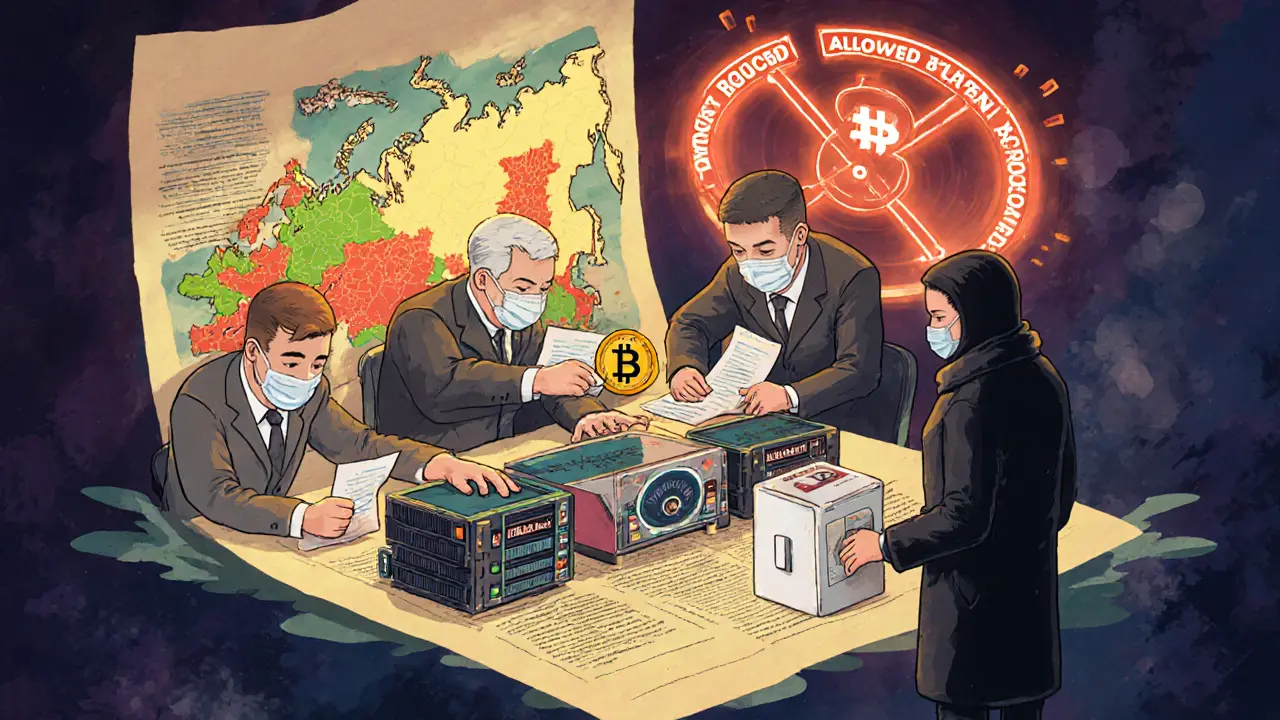
Power Priority: Miners Are Last in Line
Every electricity user in Russia is ranked by priority. Miners are classified as “fourth category” consumers - the lowest possible level. That means when there’s a power shortage, homes, hospitals, schools, and factories get electricity first. Miners get nothing.
The system works through smart meters and real-time grid monitoring. If demand in a region hits 95% capacity, the grid automatically disconnects mining equipment. This isn’t a manual process - it’s automated. You won’t get a heads-up. Your ASICs will just go dark.
This is why location matters more than ever. Mining in a region with stable, surplus power - like parts of Krasnoyarsk or Altai - is far more viable than trying to run rigs in areas with tight supply. Even if you’re registered, you’re still at the mercy of the grid.
What You Can’t Do: The Limits on Crypto Use
Even if you mine legally, you can’t spend your crypto in Russia. The government still considers the ruble the only legal tender. You can own Bitcoin, Ethereum, or any other coin - but you can’t use it to pay for groceries, rent, or services. Transactions over 600,000 rubles ($7,500) must be reported to tax authorities, regardless of whether you mined it or bought it.
Trying to use crypto to pay for goods? That’s a violation. Penalties include fines, asset freezes, and potential criminal charges. The government wants to keep the ruble dominant and prevent capital flight. Mining is treated like a production activity - like growing wheat or making steel - not a currency.
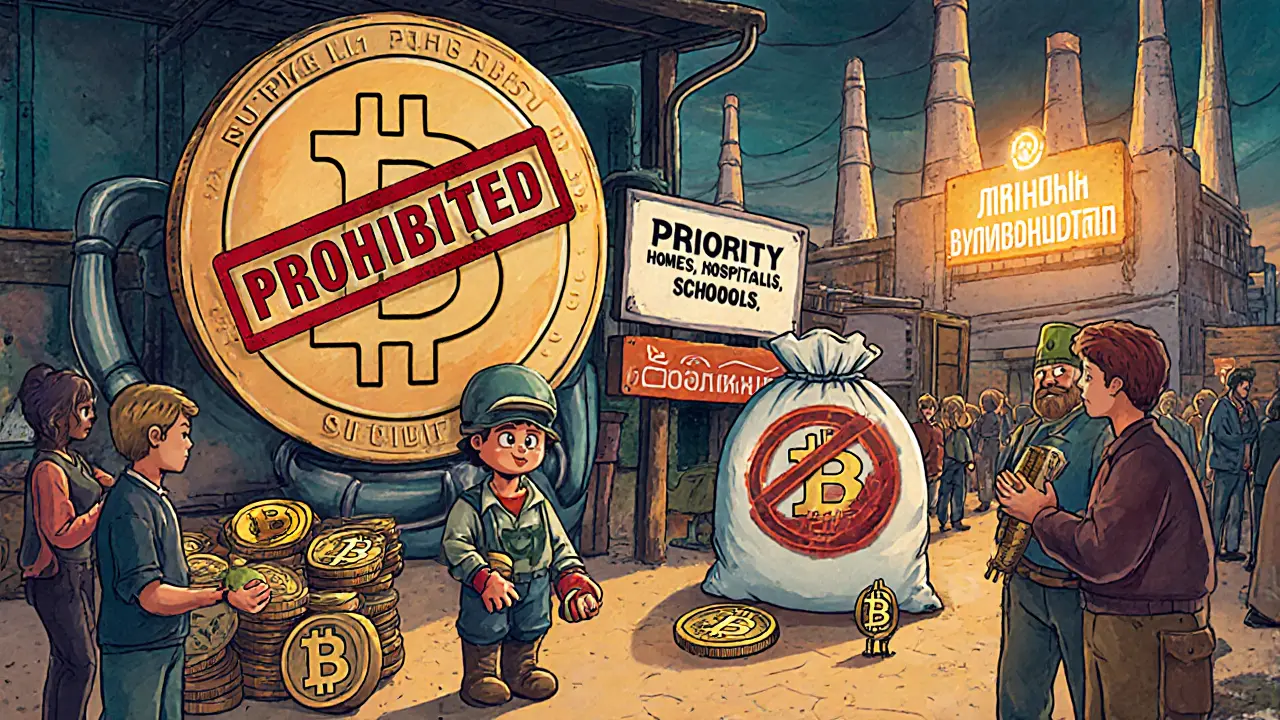
Why the Rules Are So Strict
Russia isn’t trying to kill crypto mining. It’s trying to control it. The country has massive energy resources, especially in Siberia, and mining operations were consuming more power than some cities. In 2024, mining used up to 4% of Russia’s total electricity - a number that jumped 300% in just one year.
The government saw an opportunity: turn a chaotic, underground industry into a taxable, regulated economic sector. But it also saw a threat: blackouts in winter, rising electricity prices for households, and loss of control over financial flows.
The solution? A mix of carrots and sticks. Tax revenue from mining profits? Good. Controlled, registered operations? Good. Unregulated rigs draining the grid? Not acceptable.
Is It Still Worth It?
Yes - if you’re smart about it. Mining in Russia still offers some of the lowest electricity costs in the world, especially in regions with hydroelectric dams or surplus natural gas. But the risks have changed.
Here’s what works now:
- Register your operation if you use over 6,000 kWh/month
- Avoid banned regions entirely - no exceptions
- Don’t mine in Siberia between November and March
- Use grid-connected rigs only - backup power is risky and hard to hide
- Keep detailed records of your electricity use and sales - the tax authorities are watching
Many miners have moved operations to regions like Krasnoyarsk Krai and Altai Republic, where power is abundant, regulations are clearer, and enforcement is less aggressive. Others are partnering with state-owned energy companies to secure guaranteed electricity rates.
Investors who treat mining like a utility business - not a get-rich-quick scheme - are seeing returns. But those who ignore the rules are getting caught. The days of running a warehouse full of ASICs without paperwork are over.
What’s Next?
The Russian government is still refining the system. By 2026, they plan to link mining registration to energy consumption data in real time. There are talks of introducing mandatory energy efficiency standards for mining hardware. Some officials are even considering a national mining license system, similar to oil or gas permits.
One thing is certain: Russia’s approach is working. It’s not perfect, but it’s the most structured crypto mining framework in the world. If you want to mine in Russia, you don’t need to be a rebel. You need to be compliant.
Is crypto mining legal in Russia in 2025?
Yes, but only if you’re registered with the Federal Tax Service and follow the rules. Individuals using under 6,000 kWh per month don’t need to register but still pay a 15% tax on profits. Unregistered mining is illegal and carries heavy fines.
Can I mine crypto in Siberia?
You can mine in Siberia only from March 16 to November 14 each year. From November 15 to March 15, mining is banned due to winter energy demands. During the ban, authorities can remotely shut down your equipment without notice.
What happens if I mine without registering?
You face fines of at least 200,000 rubles ($2,500). If caught repeatedly or operating at scale, fines can rise to 2 million rubles ($25,500). Equipment may be seized, and you could be barred from future registration. Authorities use the state registry to track hardware and electricity usage.
Can I use crypto to pay for things in Russia?
No. The ruble is the only legal tender. You can own and trade crypto, but you cannot use it to buy goods or services. Doing so violates currency laws and can lead to fines or legal action.
Which regions ban crypto mining completely?
Ten regions have total bans until March 15, 2031: Dagestan, Ingushetia, Kabardino-Balkaria, Karachay-Cherkessia, North Ossetia, Chechnya, Donetsk People’s Republic, Lugansk People’s Republic, Zaporizhzhia, and Kherson. Mining equipment is prohibited in these areas.
Do I need to report my mining income?
Yes. All mining profits are subject to a 15% tax. You must report income from crypto sales to the Federal Tax Service. Failure to report can result in penalties up to 20% of unpaid taxes, plus interest. Even unregistered miners must report income if they exceed 600,000 rubles in annual transactions.




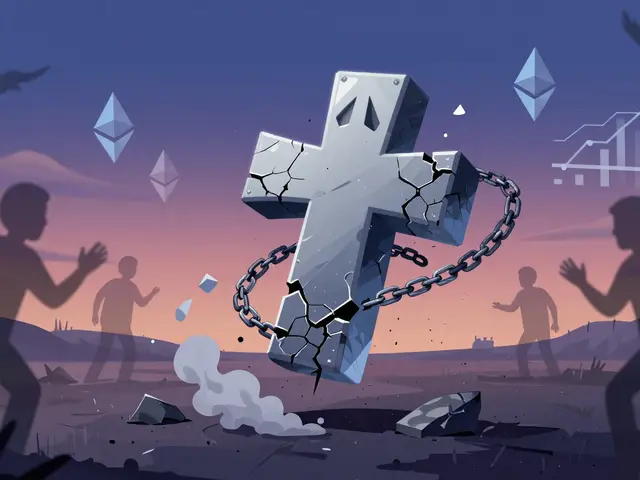
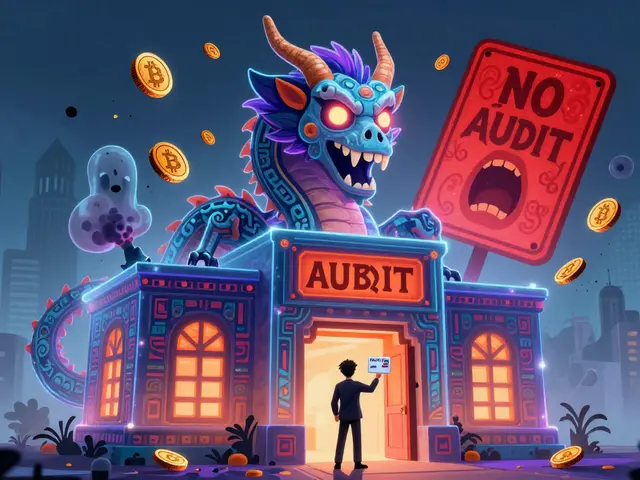



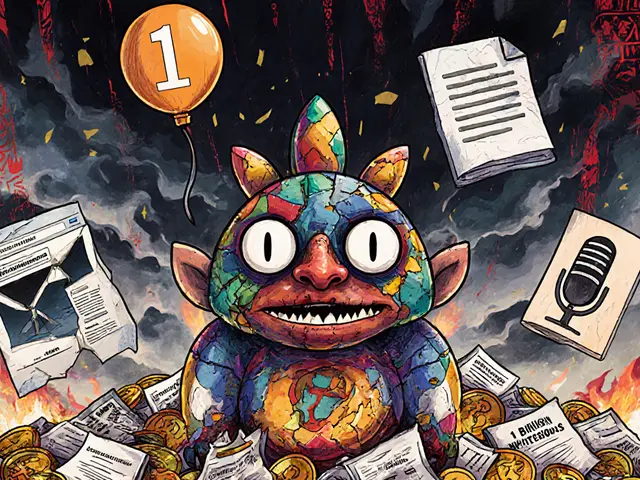

14 Comments
So Russia’s basically saying, 'You can mine, but only if you’re on our terms.' Kinda wild how they turned a chaotic underground scene into a regulated utility. I’ve seen similar moves in China years ago - it’s not about killing crypto, it’s about controlling the flow. Smart move, honestly.
Let me get this straight - you can mine Bitcoin but can’t spend it? That’s not regulation, that’s psychological warfare. They want your hash power but not your freedom. And don’t even get me started on those banned regions - they’re treating miners like terrorists. This isn’t energy policy, it’s authoritarian control dressed up as fiscal responsibility.
Oh wow. So now you need a permit to run a rig in Russia? Next they’ll make you fill out Form 7B-Δ in triplicate just to turn on your ASIC. 🙄
What’s fascinating here isn’t the regulation - it’s the philosophy behind it. Russia isn’t fighting crypto; it’s domesticating it. They see mining as industrial production, not financial innovation. That’s a radical shift from the Western narrative. It’s not about banning decentralization - it’s about absorbing it into the state’s economic architecture. The miners aren’t rebels anymore. They’re contractors.
And the seasonal bans? That’s not punishment. That’s realpolitik. When your citizens are freezing in -40°C winters, you don’t let a rig eat the power meant for a hospital. Priorities. It’s ugly, but it’s honest.
The real test will be whether this model scales. Can you tax and regulate a decentralized system without killing its essence? Or is this just a temporary truce before the next wave?
So the government can just turn off your mining rig without warning? That’s not regulation - that’s tyranny. And who’s to say they won’t start confiscating hardware next? I’ve seen this movie before. It always ends with the state owning everything and the people owning nothing.
Also, why are they banning mining in Chechnya but not in Siberia? Are they scared of the North Caucasus or just scared of the cold? Either way, this is a mess.
It’s interesting how the article frames this as 'structured' - as if bureaucratic control is somehow elegant. The fact that you need to register your ASICs like they’re livestock says more about the state’s paranoia than its policy acumen. And the 15% tax? That’s not revenue - it’s a sin tax on technological curiosity.
OMG!!! Russia is literally stealing our future!!! They let miners mine but can't spend the coins?? That's like letting someone grow wheat but not bake bread!!! And the remote shutdown?? It's like they have a death ray for ASICs!!! I saw a guy in Krasnoyarsk cry when his 120 rigs just died at 3 AM!!! THIS IS A WAR ON FREEDOM!!!
The energy prioritization framework is actually a brilliant case study in resource allocation under scarcity. Miners as fourth-tier consumers reflects a pragmatic understanding of public goods - electricity as a social infrastructure, not a commodity to be auctioned off to the highest bidder. The state is essentially internalizing the negative externalities of unregulated mining.
What’s underdiscussed is the infrastructure feedback loop: by forcing miners into surplus-energy zones, they’re effectively creating demand-side incentives for renewable grid expansion. This isn’t control - it’s systemic optimization.
So you can mine but not spend? That’s not a policy, that’s a joke. Like saying you can grow tomatoes but can’t eat them. And why are these bans until 2031? Who’s still alive to care by then? Also, the government shuts off your rig without warning? That’s not regulation, that’s just being a jerk. I’m not even mad, I’m just disappointed.
If you’re thinking about mining in Russia, don’t just look at electricity prices - look at the human cost. The people in those banned regions aren’t just losing mining income, they’re losing hope. This isn’t just about power grids - it’s about who gets to participate in the future. The ones with permits? They’re not winners. They’re just less broken.
There’s dignity in compliance here, but also a quiet tragedy. Maybe the real question isn’t whether mining is worth it - but whether we’re willing to pay the price for it.
Does anyone else think it’s weird that they’re banning mining in Donetsk and Luhansk? Those aren’t even internationally recognized regions. Is Russia banning crypto mining in territories it doesn’t fully control? That’s like banning fishing in a disputed ocean. Makes you wonder how serious any of these rules really are.
15% tax on mining profits? That’s a steal. And they’re tracking hardware? What’s next - mandatory biometric scans before you plug in your Antminer? This isn’t regulation, it’s surveillance capitalism with a Russian accent. And don’t even get me started on the 'legal tender' nonsense - you can own crypto but not use it? That’s like saying you can own a car but can’t drive it. Absurd.
I’ve lived in Siberia for years. When the temperature hits -35°C and the lights flicker, you don’t want some guy in a warehouse running 500 rigs. The government’s rules are harsh, but they’re not cruel. They’re trying to keep people warm. I know miners who moved to Altai and now have stable power and legal status. It’s not freedom - but it’s survival. And sometimes, that’s enough.
They’re using this to spy on us. I’ve read the fine print - the registry links to the FSB. Every ASIC serial number, every watt consumed, every wallet address. This isn’t taxation - it’s a digital prison. And those banned regions? They’re not about power shortages. They’re about control. The state doesn’t want crypto anywhere near its people. Not even in the shadows. This is the beginning of the end for decentralization.